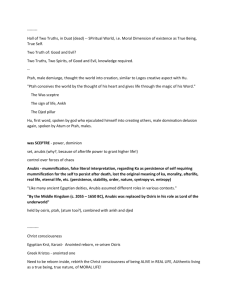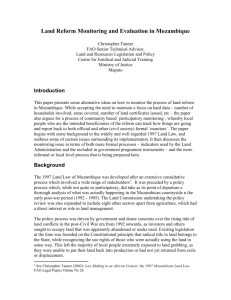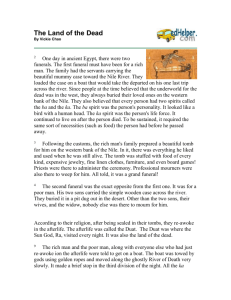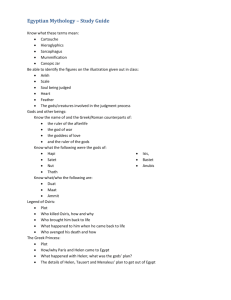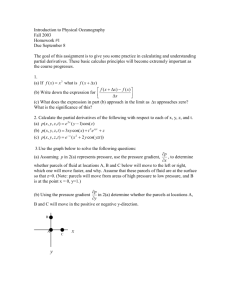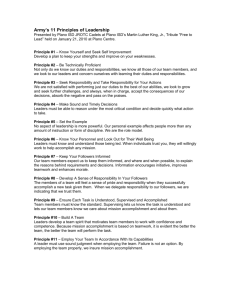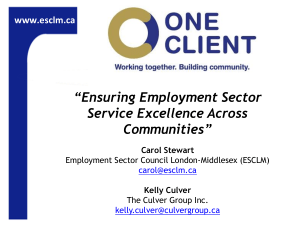Rose-411-411_ppt
advertisement
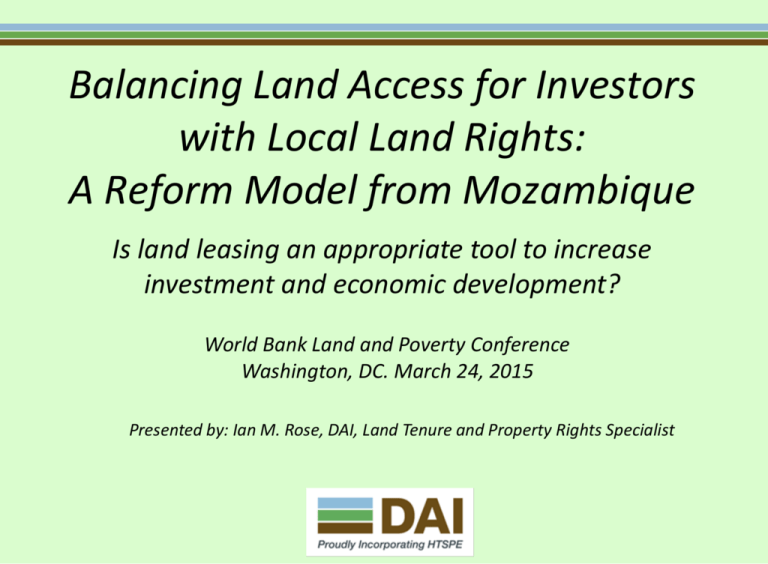
Balancing Land Access for Investors with Local Land Rights: A Reform Model from Mozambique Is land leasing an appropriate tool to increase investment and economic development? World Bank Land and Poverty Conference Washington, DC. March 24, 2015 Presented by: Ian M. Rose, DAI, Land Tenure and Property Rights Specialist Context Within Existing Legal Framework • Constitution: All land in Mozambique is owned by the state in trust for the people. Land cannot be sold or mortgaged • Citizens, foreigners, communities and corporate entities may hold or acquire land use rights (DUATs) for varying periods (prazos) • Transfer of DUATs: automatic for urban parcels (prédios urbanos), but requires prior government authorization for rural parcels (prédios rusticos) • Requirement of a development plan (plano de exploração) for each parcel (very few exceptions) • Estimated that less than 5% to 10% of parcels formally registered • Customary rights to land recognized under Land Law 2 Why is there a need for legal reform? • Government discretion in the approval process to transfer DUATs (of rural land, vacant urban land) arguably impedes investment • Transferor must be in compliance of plano de exploração, unless there is justifiable excuse (opportunity for subjectivity regarding both aspects) • If transfer not approved, DUAT holder may lose investment • It is restricted transferability combined with plano de exploração requirement that impedes investment • Regime of prior approvals with government discretion: introduces risk not just because of opportunities for rent-seeking but also, more neutrally, because of under-resourced government offices 3 Transferability: In Context of Different Economic Models Classic (Market) Economic Model: • Unrestricted transferability will eventually place land under control of bestpositioned user to develop land for the most productive allowed use. • “Invisible hand of the market” more efficient than state-imposed regulation State-Oriented Model: • Places trust in government to allocate land. This is – partially – the underlying origin of features of Mozambique land law such as: restricted transferability; plano de exploração. Unrestricted transferability – and not “ownership” – is what matters! “Owner” of land in U.S. must pay property taxes and always faces expropriation for public purpose. Not significantly different from a secure, long-term, transferable, renewable leasehold right. 4 Is limited transferability the reason we see large tracts of undeveloped land? Without much more detailed studies and analysis, we can only say maybe. We should not overstate the obstacle because: (a) Savvy or sophisticated investors can hold land via a corporate entity and effectively transfer rights to a third party through the sale of shares in the company; (b) Savvy investors can craft the plano de exploração with less detail rather than more detail, allowing flexibility later on (c) Factors completely independent of transferability may explain underdeveloped tracts of land, such as: lack of infrastructure to move goods to market; suitability of land (quality and location) for productive use in relation to competition; lack of confidence in court system to resolve disputes. 5 What is a “cessão de exploração”? A temporary transfer of a DUAT. A temporary assignment of land use rights. Goal of well-drafted “cessão de exploração” regulation from economic perspective: • Lower transaction costs of transferring land use rights (even if only a temporary transfer/assignment of rights), thus improving the enabling environment for investments • Effectively create a land rental market, which is increasingly seen as accomplishing many of the same gains as land ownership market 6 Primary Categories of Parcels Addressed by the Regulation: 1. Prédios Rusticos held by Private DUAT title holders 2. Community land in rural areas 3. Individual DUAT holders via good faith or customary right (rural) 4. Prédios Urbanos (originally. now excluded) 7 Are the number of approvals (and corresponding discretion) reduced in the cessão de exploração regulation, as compared with an original DUAT application or with a DUAT transfer application? • In the original early 2014 draft released by DNTF for comments: not significantly. • In the current draft being circulated: yes. 8 Private DUAT title holders of prédios rusticos Procedural Requirements for Cessão de Exploraçao March 2014 Pending Draft Recommend Authorization of: Governor; Ministro de Ag; or CM (according to parcel size) Yes Yes SPGC (Serviços Províncias de Geografia e Cadastro) Status of Title held by Lessor Parcel Demarcated Definitive Yes Provisional Yes Provisional Yes Re-file Plano de Exploração Yes Technical parecer Many Only if changed Fewer Only if changed Minimal New edital Yes No No 9 Private DUAT title holders of prédios rusticos [continued] Procedural Requirements for March Cessão de Exploraçao 2014 Pending Draft Recommend Prior Registration with Registo Predial Executed via escritura pública Yes No No Yes Yes Yes 10 year max prazo, renewable 3 times (30 years) or 1 year prazo renewable 10 times (10 years) Same Same Lengthen No C de E in final 3 years of DUAT Same Same Eliminate Restriction 10 Expected impact for land held by private (rather than community) DUAT holders • Modest, unless procedures streamlined as in pending revision. • Biggest impact in cases where rights-holder does not wish to transfer DUAT (even if it could), but rather needs partner/investor without permanently giving up control. Partner/investor has security of its interests being recorded in cadaster at SPGC and registo predial. • Small holders may also benefit as they are more likely to have land titled under their personal name, rather than via corporate entity. • In revised draft, for informal DUAT holders: only need DUAT formalized, not all the other paperwork. (No conversion to DUAT “pedido” application process, as the original draft contained). 11 Community Land Special Considerations: • Consent (FPIC – Free, Prior, & Informed Consent) • Meaningful participation of women & vulnerable groups in decision-making processes of community • Compliance (posttransaction) Monitoring 12 Community Land • Land Law Regulation (LRT) is explicit that C de E “… depende de consentimento dos seus membros” • Original: included reference to “consentimento da respectiva comunidade,” but without any further guidance • Pending draft: No reference at all to community consent (not advisable) 13 DUAT rights of community members, in principle, are very strong: co-title rights Existing Guidance on Third-Party DUAT applications: • Land Law Reg originally specified 3-9 members from the community, plus occupants/title-holders of neighbors, would sign minutes of consultation • 2010 Decreto and 2011 Diploma Ministerial: signing of consultation by Conselho Consultivo; two phases (two consultations) Anexo Tecnico to Land Law Reg on Community Land Delimitation: Acta of consultation signed by 3-9 members of community “chosen in public meetings” Land Law Article 30: “mechanisms of representation” of local communities would be established in future law 14 Recommendations – Community Land • Community Consultations – clarify process • Community Members/Representatives (not just members of Conselhos Consultivos) should sign documentation • Minimal Standards for Community Representation • Delimitation of community sufficient, but area affected by lease should be demarcated • Strengthened regime of post-transaction monitoring • Consider longer initial prazo (i.e. more than 15 years) 15 Recommendations for Land Leases (Cessão de Exploração) of Private Parcels • Approval of Cessão de Exploração at regional technical office • No need to refile and reapprove the Plano de Exploração (unless substantially changed). • Allowed in cases where lessor has a provisional or definitive DUAT • Longer initial prazo (i.e. longer than 10 years) • No new edital (public posting) • No prior registration required with registo predial (but required afterwards) • Focus on post-transaction monitoring rather than prior approvals • Include urban parcels 16 General Recommendations for Reform of Related Legal Framework • Approval deemed granted in absence of explicit government approval given within determine time frame • Less reliance on pre-transaction approvals; more reliance on post-transaction monitoring • More reliance on zoning; less reliance on individual development plans • Merger or synchronization of the land/DUAT registry and the property registry (multi-purpose cadaster) 17 Obrigado! Thank you!
